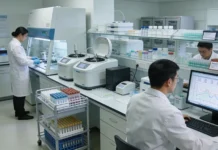Rachel Reeves, the UK Chancellor of the Exchequer, has asked more pharma investment coming in Britain, even as she doubles down on the commitment by the government when it comes to competitive drug pricing.
Speaking to the reporters on the sidelines of the international meetings in Washington, Reeves went ahead and struck a delicate balance by positioning the UK to be an irresistible hub for life sciences innovation while at the same time, firmly rejecting any sort of a rollback on efforts so as to keep medicines affordable for the NHS.
According to Reeves, they do need to make sure that it happens to be a very attractive place for pharmaceuticals, and that includes pricing too. However, in return for that, they want to see more pharma investment coming in Britain. Reeves’ words come at a very precarious moment for the industry, as there is a string of high-profile pullbacks by certain major drugmakers that have cast a shadow over the ambitions of the UK to become the premier life sciences powerhouse of Europe by 2030.
A Sector Which Is Under Strain
It is well to be noted that the pharmaceutical industry has long been regarded as the crown jewels of Britain, as it contributes more than £108 billion a year to the economy and also supports hundreds of thousands of jobs. Right from the hallowed labs of Oxford and Cambridge to the sprawling manufacturing sites based in the North, the UK happens to boast of a world-class ecosystem when it comes to drug discovery and development. Still, this year alone, the sector has gone on to witness almost £2 billion when it comes to planned investments that have been either scrapped or paused, as per the industry estimates.
The fact remains that the casualties are stark. In September 2025, Merck, the US giant that is known as MSD outside of the US, abandoned a £1 billion research hub in King’s Cross in London, thereby axing 125 scientific positions and also citing a quite unattractive business environment. Eli Lilly followed thereafter by freezing many of the UK projects, whereas AstraZeneca, which is a British-Swedish stalwart, halted a £200 million R&D expansion at Cambridge and, earlier in 2025, also ditched a £450 million vaccine plant based out of Merseyside. These decisions, as per the executives, stem from a very toxic mix when it comes to regulatory hurdles, which is indeed a very controversial clawback tax as far as the drug sales are concerned, and also the strict NHS reimbursement rules, which happen to prioritize value-for-money over incentives for innovation.
The chief executive of the Association of the British Pharmaceutical Industry (ABPI), Richard Torbett, has gone ahead and described the trend as a chronic underinvestment that warns it inflicts suffering onto patients by delaying the access to cutting-edge treatments. This indeed has to be a wake-up call, said Torbett to BBC Radio 4. The UK really happens to have the potential to be winning more billion-pound R&D investments, and rather the fact of the matter is that they are losing them.
Lord Patrick Vallance, the science minister and also a former GlaxoSmithKline executive, echoed these concerns, acknowledging the fact that declining NHS spending on medicines, down in real terms in recent years, goes on to risk eroding the competitive edge of the UK. It is worth noting that Vallance is set to join industry leaders, which includes the likes of UK president of AstraZeneca, Tom Keith-Roach, for high-level talks that are aimed at salvaging the momentum of the sector.
Elevating Clinical Trials and Streamlining Approvals
At the center of this impasse happens to be a transatlantic tussle on the drug costs. The UK has long negotiated its lower prices for medicines by way of its NHS framework, which is a model that has already saved billions; however, it has irked American policymakers who still argue that it amounts to freeloading on US innovation. Apparently, the administration of President Donald has amplified this rhetoric by way of threatening 100% tariffs when it comes to pharma imports unless the firms relocate their manufacturing to America, which is a move that could ripple quite painfully via global supply chains.
Interestingly, tensions boiled over at a private dinner in September 2025 between Reeves and Warren Stephens, the US Ambassador to the UK, where the envoy reportedly asked the chancellor to sweeten the pricing deals or face an investment exodus. Trump has gone on to float the most favored nation policy, which could as well cap the US drug prices at their lowest levels that are paid abroad, therefore potentially forcing Britain to push up its own rates or else watch American markets turn dry for the UK exporters.
But Reeves is unyielding. Her government has already offered what it calls a generous as well as unprecedented £1 billion package for three years so as to bolster clinical trials and also streamline approvals, therefore cutting review times to less than 150 days. Still, the pharma leaders remain a bit skeptical, pointing to much broader regulatory burdens and also an uncertain post-Brexit spectrum as deterrents.
Luring the FDI to Improve the Pharmaceutical Sector
The intervention by Rachel Reeves is more than a sector-specific plea – it happens to be a microcosm of a high-stakes economic reset by Labour under Keir Starmer, the UK Prime Minister. Since taking office in July 2024, the chancellor, who, by the way, is the first woman in the role, has indeed championed securonomics, which is a blend of fiscal discipline and private-sector unlocking that’s designed to roll out the fastest G7 growth.
With public finances getting strained and the taxes off-limits for hikes when it comes to corporations or income, her strategy happens to hinge on luring the foreign direct investment, pharma included, by way of stability and targeted reforms.
With regard to this, Reeves has already gone on to ease the banking separations, pushed pension funds towards much riskier UK assets, and even floated a sovereign health fund so as to inject state cash into drug development. She has also culled the competition watchdog’s leadership so as to signal a lighter regulatory touch. However, with Wall Street at a high amid tariff threats from Trump and China’s rare earth export curbs also adding to the global volatility, the pitch by the chancellor feels like a high-wire act.
Critics, which includes the opposition voices on social media, decry pharma retreats as a brutal £1bn blow when it comes to growth plans, with one user saying as to how much more of Rachel Reeves can Britain actually take. Industry watchers see a vicious cycle – which is less investment means slower innovation and higher long-term NHS costs, along with a dimmer allure for projects that lie ahead.
Doing the Balancing Act
It is well to be noted that the deeper dilemma happens to be ethical as much as economic. As one analyst framed it on social media, it’s a question of who deserves to live longer, and that too at what price? The fact is that affordable drugs save lives and stretch the public budgets; however, without strong R&D funding, the pipeline of breakthroughs, from cancer therapies to next-gen vaccines, would run dry.
Notably, the remarks made by Reeves in Washington signal a very practical pivot – the concessions on attractiveness, but no surrender when it comes to affordability. Whether this sort of quid pro quo sways the boardrooms or not remains to be seen. As the chancellor gets back to London ahead of the autumn budget, the focus is on her to go ahead and deliver wins that are tangible– or risk the cold shoulder by pharma turning in a full freeze-out.
As for now, the life sciences dream happens to hang in the balance, which is indeed a testament to the bold vision of the chancellor and the prominent headwinds that it faces.



















